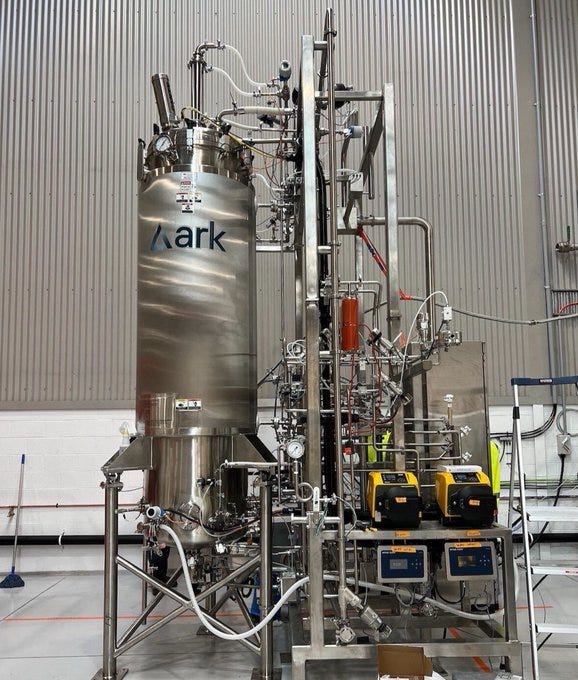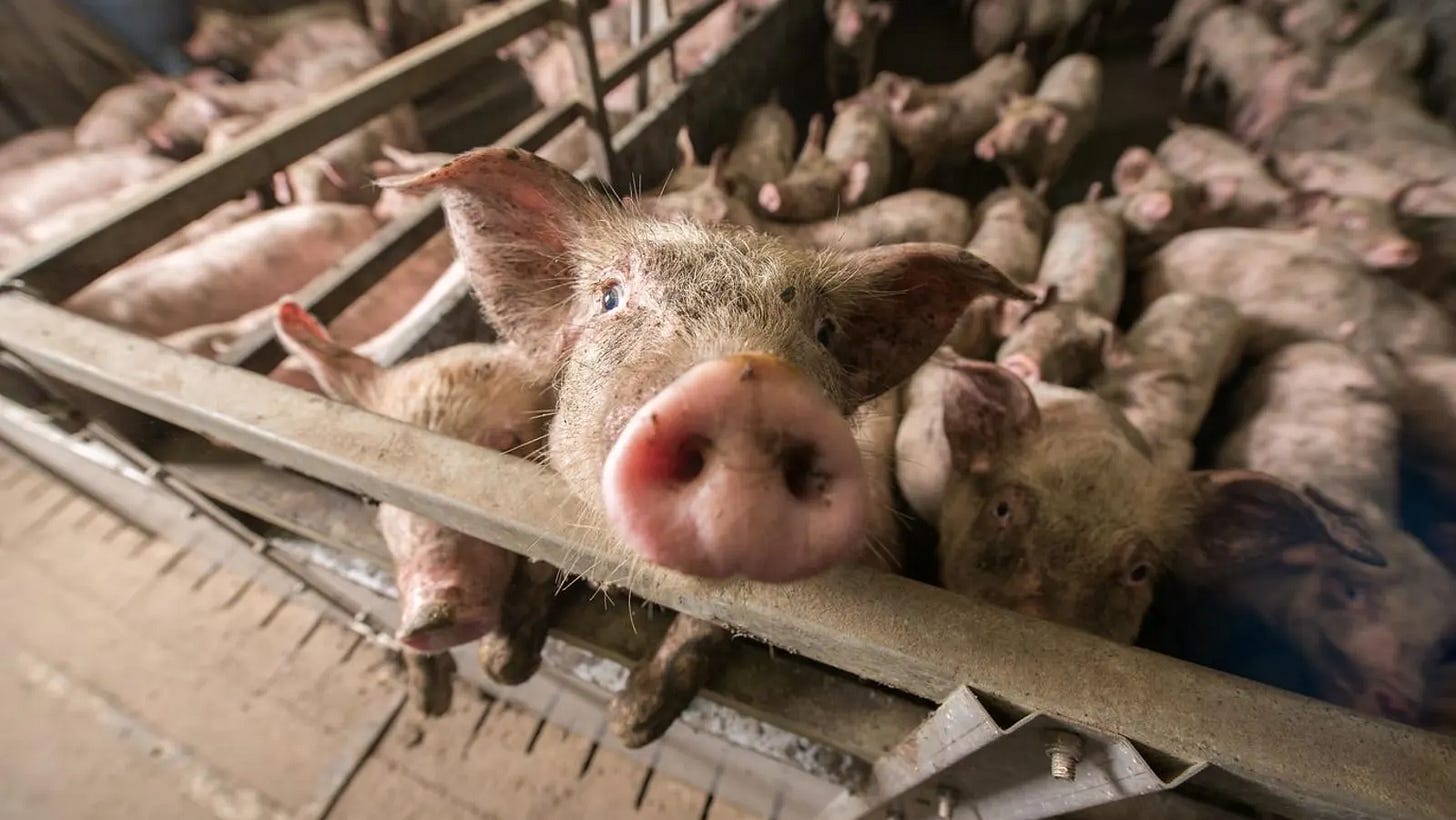John Fetterman and Ron DeSantis join forces to prolong animal abuse on factory farms
If love of dogs is one of the few bipartisan issues remaining in America, so is harming animals raised and killed for “food”
A modified, smaller version of this article first appeared in This Week in Animal Protection.
North Dakota Governor Kristi Noem, a Republican, admitted she shot and killed Cricket, her 14-month-old puppy. Although she claims she did it because he was “worthless” and “untrainable,” others say she has anger management issues and did it in a fit of rage. Either reason is not only cruel but criminal.
After receiving backlash from virtually everyone, including those in her party, Governor Noem claimed Cricket was “dangerous,” which no one believed, as she also admitted to killing a goat who smelled “musky” and a horse. But Noem’s attempt to quell criticism does not mean she is backing down. On the contrary, in a recent interview, she stood by her prior claim that if she were in the White House, she’d have Commander, President Biden’s dog, killed too:
The first thing I’d do is make sure Joe Biden’s dog was nowhere on the grounds. (‘Commander, say hello to Cricket for me.’)
The first thing she’d do is not to tackle inflation, provide regulatory relief to spur further economic growth, improve and expand access to healthcare, lower crime, defend Ukraine, Taiwan, and Israel, constrain Russia by bringing more countries, like Moldova, into the NATO alliance, retake Kabul to protect women and girls from the Taliban or isolate China from its Pacific rim neighbors by expanding trade and other multilateral relationships. Nothing to improve the lives of the American people or freedom-loving people around the world. She would shoot a dog.
The rare, nearly universal condemnation of Governor Noem by members of both parties lends credence to the notion that love of dogs is one of the few bipartisan issues left in America. Indeed, a group of Republican and Democratic lawmakers disgusted by Noem’s killing of Cricket launched “the Congressional Dog Lovers Caucus,” noting that “both sides of the aisle reject animal cruelty and support protecting man’s best friend.”
But if love of dogs is a bipartisan issue, so is abuse of animals raised and killed for “food.” As reported recently, Republican Governors Ron DeSantis of Florida and Kay Ivey of Alabama signed legislation banning the manufacture, distribution, and sale of cultivated meat, doing the bidding of the factory farm industry.1 And they are getting support from Democratic Senator John Fetterman, who stated that he supports such bans. (He is not the only one to support farmed animal abuse: Both Presidents Trump and Biden sided with the pork industry to defend some of the most abusive practices of the factory farming industry.)
This isn’t the first time Fetterman has spoken out against various forms of alternative meat. He’s also co-sponsored a slate of bills supported by factory farm trade groups. Those include bills to ban plant-based egg and dairy companies from using words like “egg” and “dairy,” and to set restrictions on what plant-based meat companies can write on their labels.
In a bizarre Twitter post, Fetterman shared a photo of a bioreactor to defend his position, writing, “this is the thing that makes lab meat.” In another post, he said he “would never serve that slop to my kids.” However, such a post is not self-explanatory and does not prove his point. Those bioreactors process all “raw” meat into food, including the bodies of pigs, chickens, and cows. They are used to make almost everything Fetterman greedily eats and serves to his kids, including sausages, hot dogs, hamburgers, nuggets, and more.
More importantly, making cultivated meat is hardly concerning or scary. Cultivated meat is made from a one-time draw of stem cells. The stem cells are then replicated in a laboratory and grown in an animal-free medium to produce real meat from animals without killing.
Not only is raising animals to be eaten the largest driver of climate change and the primary cause of human disease and early death, but cultivated meat will allow Agri-business to close breeding facilities, factory farms, and slaughterhouses. It will sideline the fleets of trucks necessary to transport animals from the hatcheries to the warehouses and, from there, to their deaths. It will spare the abuse and killing of roughly 74 billion land animals and one trillion sea animals yearly.
In contrast to a clean, sterile, and humane bioreactor, factory farming is terrifying. Comparative neurobiology — the study of how different parts of the brain are connected — proves that when the “structures in the brains of animals” are “organized in the same way as the corresponding parts of our brains,” and “these parts look the same” and “function[ ] in the same way,” then the subjective experiences are the same or at least similar.
Specifically, if the animal has a cortex — like chickens, cows, and pigs — the animal is sentient. And “Beyond sentience lies consciousness and self-awareness.” As such, “its subjective experience can be understood by degrees of similarity to ours”:
With similar brain architectures for the experience of joy, pain, and even social bonds, we can assume that animals experience these things much like we do…
If you want to know what it’s like to be a cow in a slaughterhouse or a pig on a factory farm, imagine how you might experience those things:
An animal who is aware of his or her own pain and suffering may well experience the existential fear associated with imminent death. And awareness of other animals’ fear can only heighten such terror.
Terror.
But raising and killing billions of animals is also terrifying for people — something that even those who eat animals would not be able to stomach.

Any critique of novel food technology must also include an honest reckoning with what it seeks to replace: in this case, conventional meat production, a highly industrialized system that depends on a slew of horrific practices, including:
Feeding cattle [cows] chicken feces
Feeding pigs feces from other pigs
Forcibly impregnating animals…
Ripping out female shrimps’ eyes so they lay more eggs
Force-feeding ducks
Grinding up male chicks alive because they can’t lay eggs
Indeed, factory farming is the greatest source of human-caused suffering on the planet. From the moment they are born to the moment they are killed, most animals raised for food will experience unremitting torment. They will not know contentment, safety, happiness, or kindness. Instead, they will live short lives characterized by inescapable discomfort, social deprivation, and constant stress, all punctuated by moments of pain, fear, and, eventually, a brutal and untimely death.
And for what? For nutrients we can get from plants or develop from cells. But Fetterman doesn’t care about these animals and refuses to answer questions about his indifference. When it comes to protecting farmed animals, he and DeSantis are two sides of the same coin.
Clowns to the left of me, jokers to the right.
In addition to defending and prolonging abuse, the cultivated meat ban threatens innovation and free markets and “deepens our country’s dependence on imports from countries like China.”







I am heartbroken to learn about the hypocrisy of our politicians who only care about getting votes while showing no compassion for our loving family friends, the animals. If we had a dog running our government, instead of greedy and insensitive politicians. we would have love and peace. Perhaps Nathan Winograd should consider running for President — he would get the votes of animal lovers. Sincerely, Dr. Jerry Neidich, Ph.D.
The baby chicks… this is what hardens people… unfortunately “jobs” of this sort are oftentimes the only kind available to the struggling poor and recent arrivals. For both animals and people, surely American capitalism can do better. Profits can still be made but not at the expense of the universal moral compass. Ethics + compassion + imagination does not necessarily equal a loss in the corporate bottom line.